Stone or solid surface? Concrete or quartz? Marble or Granite? Use this quick guide to choose your countertop
Kitchen platform or countertop (or worktop!) is one material that will pretty much define your kitchen, and you want to define it right. Whether it’s pragmatism you’re after or something to give your guests to talk about when they see your kitchen.Indian kitchens undergo heavy cooking, which is why finding the right, long-lasting, sturdy materials becomes imperative. Here are a few kitchen countertops options to choose from
The Unique Picks for kitchen counter:
Marble Countertop
If luxury is what you are after, then marble is the countertop material for you. A glossy white surface with beautiful veins all over it, marble elevates the kitchen like nothing else. However, with great luxury comes great price—and care.
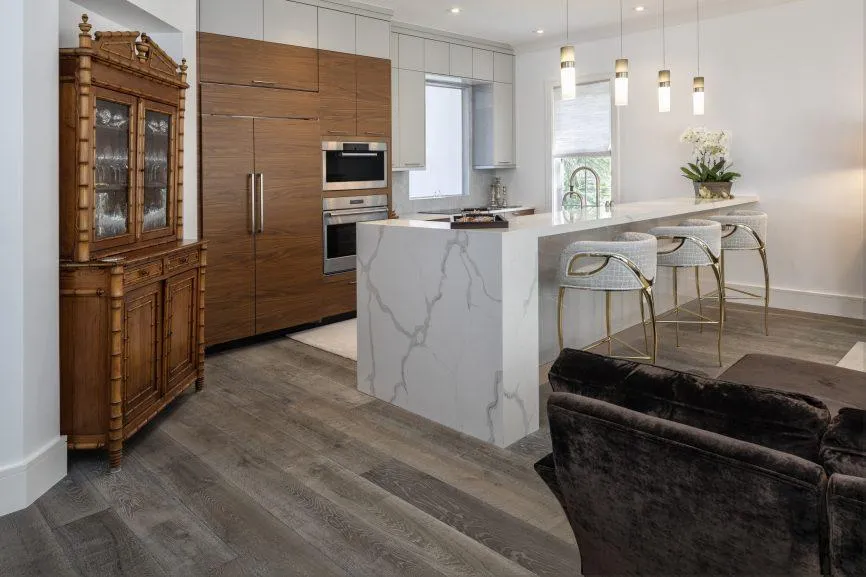
Pros:
- Marble countertops are amazingly gorgeous.
- They are made up of material naturally occurring in the environment.
- If well-maintained marble can increase property value.
- In the right condition they long last, and they are truly unique.
Cons:
- Marble is incredibly expensive.
- The marble slab is too heavy, So a trained professional is required for installation.
- They stain easily.
- They can be delicate.
- They degrade over time.
Granite Countertop:
A black granite countertop goes well with pretty much all the colors you can find in a modular kitchen catalog. Once you have installed it, you have absolutely nothing to worry about. It is ideal for a busy kitchen that sees a lot of rough use. Since it is easy to clean and maintain, you can even chop straight on the granite and clean it off. Granite is scratch and stain proof and retains its shine for years. Italian granite comes in various colors too.
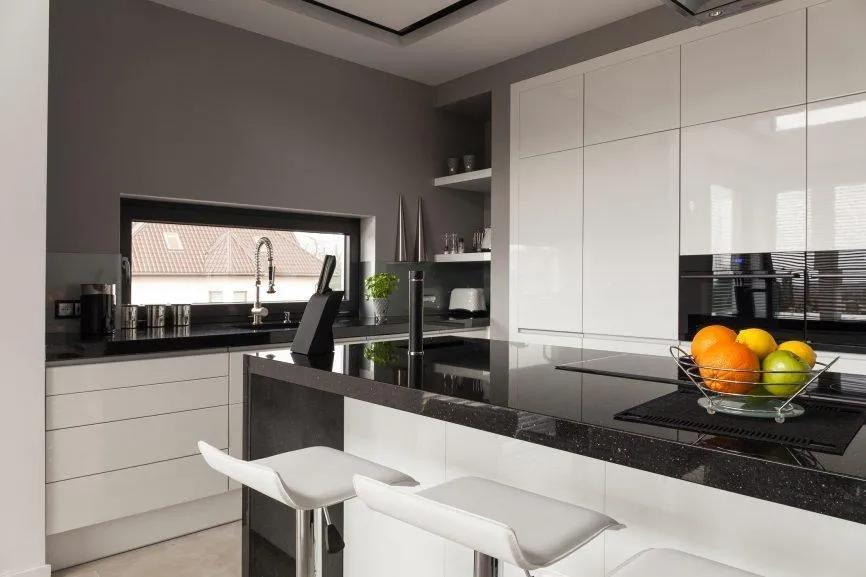
Pros:
- It is super strong, heat-resistant, and can stand up to extreme levels of wear and tear.
- Granite comes in a myriad natural color (off-white, pink, black, green) and patterns (speckled, swirls, streaks, waves).
- The price varies, depending on color thickness, and patterns, thus making it accessible to all.
Cons
- Its natural variations in color could work against it for those who like a consistent, uniform look. This also makes it harder to later replace a part of it with an exactly matching piece.
- Natural stones are porous; while granite is far less so than others, it still requires to be sealed at installation.
Quartz Countertop:
Also known as engineered stone, quartz for countertops is manufactured from granules of crushed quartz, which are mixed with a coloring pigment and a binder (polymer resin or, sometimes, cement). . It looks like natural stone. It’s a cheaper substitute for high-end expensive granite and is available in multiple colors. Quartz has all the qualities of granite but requires a tad bit of maintenance and caution especially when you’re using very hot utensils in the kitchen. Hot pans and pots can be kept on the counter but not for long otherwise they may leave burn marks. It isn’t porous as marble and thus will not absorb liquids.
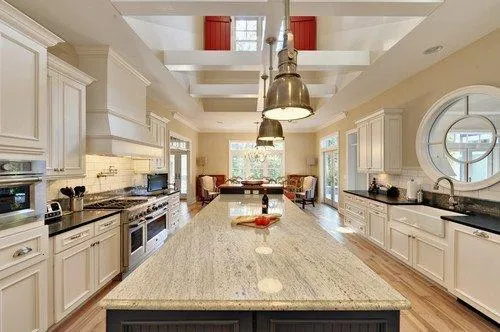
Pros:
- Due to its unique composition, it is considered the most resistant to scratches and stains.
- It maintains its polish for a long time.
- Quartz is available in a large range of colors because of the pigments used.
- It is non-porous and does not require any sealing, thus offering a virtually maintenance-free work surface.
Cons
- Quartz is not as resistant to heat as granite or concrete.
- It discolors over time if exposed to direct sunlight, although that would take several years.
- Though a man-made material, it is as expensive as natural stone or timber.
Nano White (G5) Countertop:
Nano white crystallized glass is commonly known as nano white or nano white marble because it replicates the look and shine of premium quality white marble. This material is primarily imported from China and is a great way to add sophistication and impart a high-end luxurious look to the home’s decor. So, if you are looking for a trendy new material that could overcome the flaws of natural white marble, then here is all you need to know about nano white.
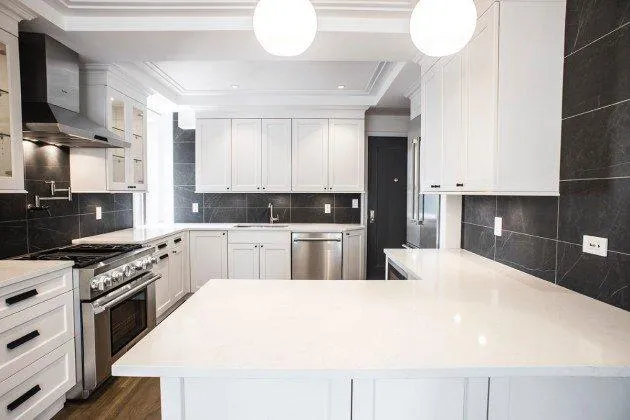
Pros:
- Nano white is a very hard, long-lasting, and highly durable material that is hard to chip or break.
- The milky white color of nano white and its highly reflective surface make it a popular substitute for white marble.
- Unlike natural white marble, nano white is very dense and non-porous, which makes it stain-, scratch- and acid-resistant. Therefore, nano white is easy to maintain.
- Also, this material does not need to be sealed. It does not support the growth of bacteria, viruses, mould, or mildew, which makes it one of the most hygienic materials available in the market.
- Nano white is eco-friendly and recyclable since it is made up of natural minerals.
Cons:
- Nano white is very hard, so only specialized contractors can work with this material and install it.
- Nano white marble is expensive.
- Another drawback of nano white is that the joint lines turn blackish over a period of time.
- One should use only clear resins (glue) for installing nano white slabs or tiles, which do not turn yellowish over a period of time due to exposure to UV light.
Solid Surface:
This man-made material consists of acrylic particles and resins that are pressed into solid sheets. Solid surfaces have become synonymous with the brand Corian made by DuPont, although there are several other (mostly) imported brands (LG, Samsung) in the market. It can be made to look like granite, quartz, marble, and stainless steel.
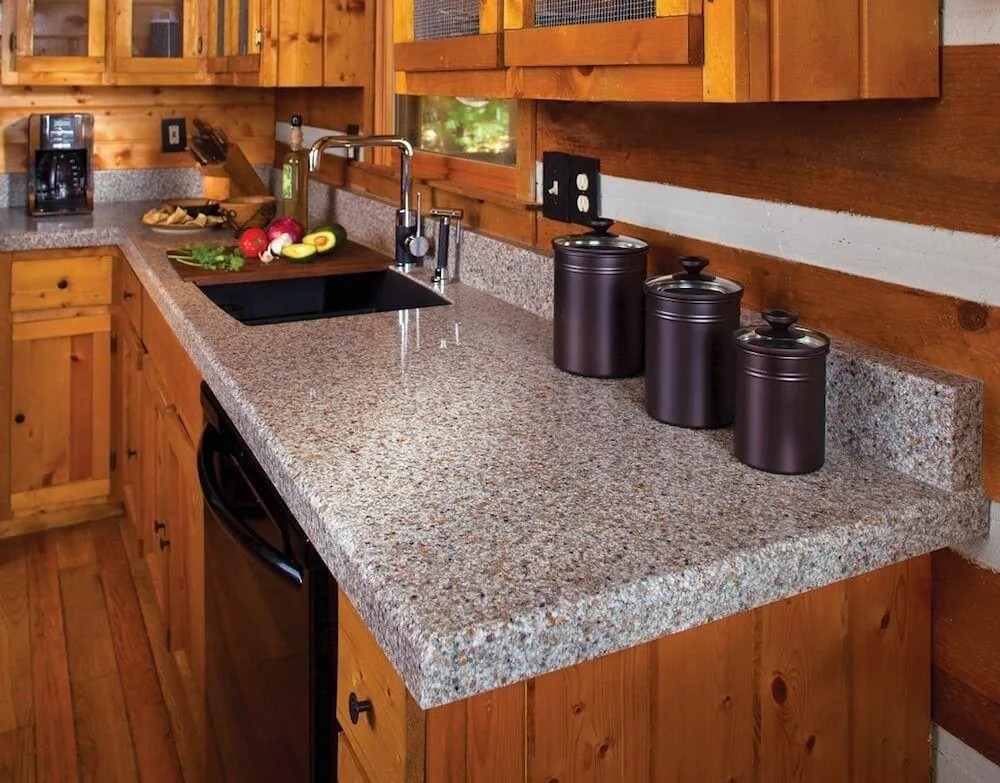
Pros
- The seams are almost invisible, so it gives a smooth, uninterrupted look.
- Available in variety of colors.
- A solid surface can be bent to any shape, as it is a malleable material. Hence, it is easy to integrate with sinks for a seamless appearance.
- It comes in a large variety of colors and patterns. Moreover, it can imitate other materials, such as marble and concrete.
- Any surface damage can be easily sanded out.
Cons:
- It is susceptible to damage from heat, such as hot utensils.
- It is easy to scratch and dent.
Concrete countertop:
Concrete in the kitchen can take on a more refined avatar than its sidewalk counterpart, when polished and coloured (or even if left in a rustic form).
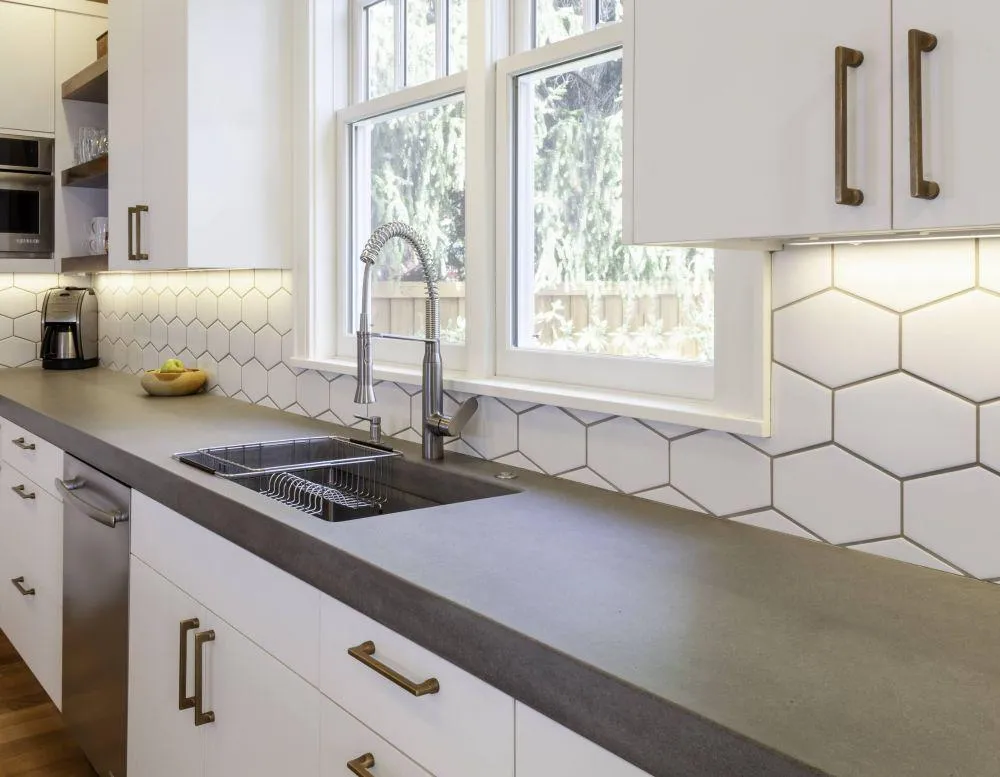
Pros:
- Extremely hardy; heat- and scratch-resistant.
- Since concrete is laid on-site, it can be customized as per requirement in structure, shape, color, finish, and texture.
- It has a uniform finish.
Cons:
- It is susceptible to cracks if not properly treated while being laid.
- It is relatively porous, so it must be regularly sealed.
- It cannot be prefabricated and must be poured on-site.
Wooden Countertop:
A wooden countertop can make your kitchen stand out with its old-world charm. It is eco-friendly and also contains enzymes that can kill bacteria. Needless to say, it is durable and can’t be damaged easily. You can choose from cherry, teak, yellow cedar, mahogany etc but for a more carefree use, you can finish the surface with waterproof varnish.
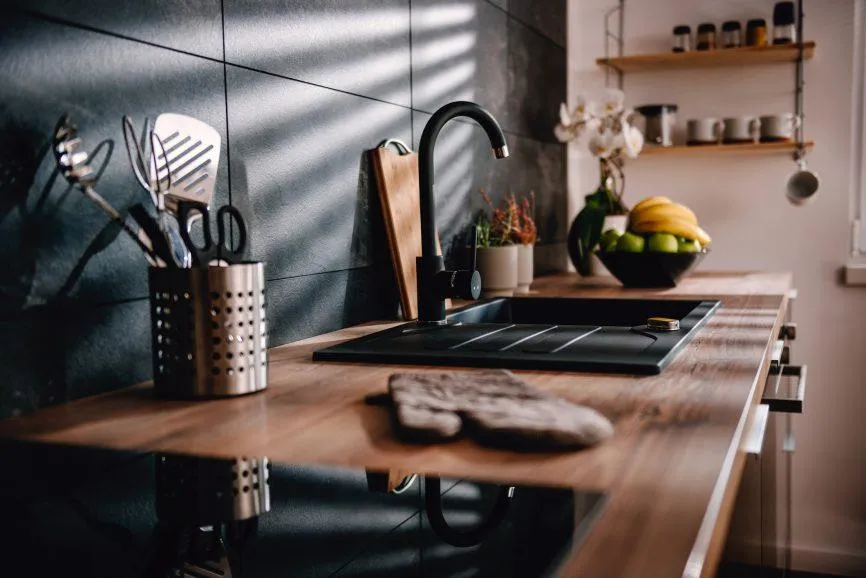
Pros:
- The number one reason people choose wood countertops is their beauty. They give any kitchen a warmth
Cons:
- It's costly.
- If you live in humid conditions, avoid using wooden countertops as they tend to expand and contract with changing humidity levels.
- Requires proper sealing if not sealed correctly, it offers a porous surface. Water seeps in if not treated properly.
- May Need Refinishing. Since wood is softer than tile, stone, and metal, it can be more easily damaged, it has a lot of scratch and Dent problem.
Steel Countertop:
Stainless steel countertops are quickly becoming the most preferred option to cook upon. Besides looking elegant and pretty, stainless steel is quite indestructible. Stainless steel countertops were largely seen in restaurants and professional kitchens, but with the material becoming a part of our homes, they are increasingly replacing marble, granite, and wood. Just like utensils of steel, These countertops have immense benefits, are easy to maintain, and can be a part of your home for years
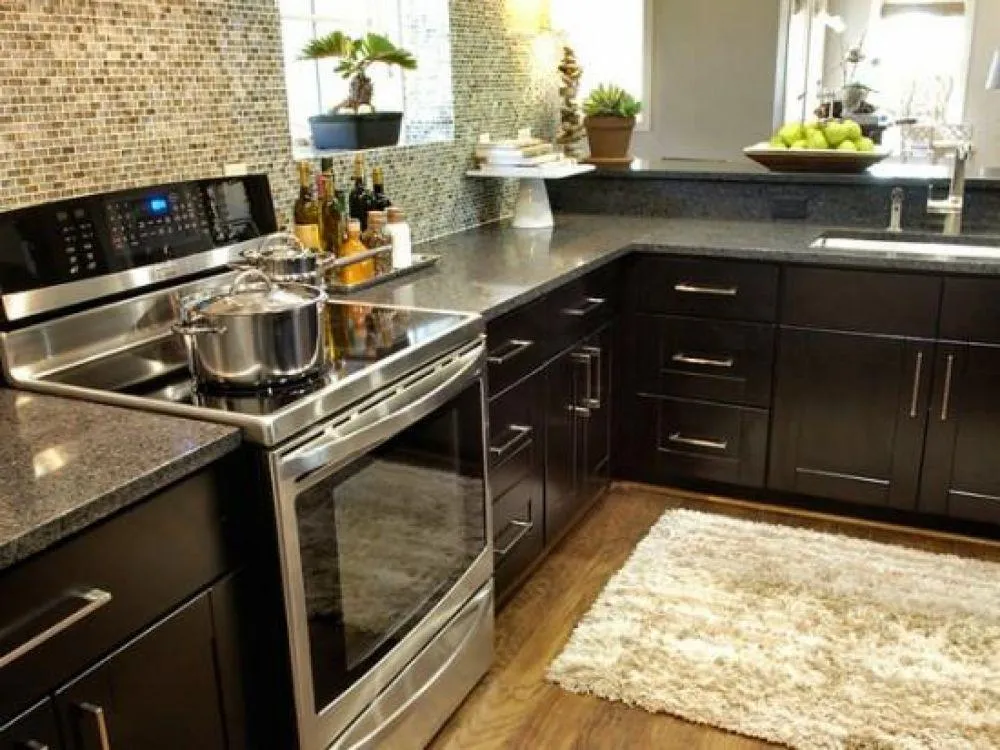
Pros:
- Stainless steel countertops are durable and resilient and can withstand anything. They are resistant to water, stains, and heat. Because they are non-porous, no solids or liquids penetrate them, and bacteria, mold cannot build upon them. Acids in foods, food coloring, and oils cannot stain them, nor can heat crack or destroy them. If cleaned properly and maintained well, steel counters provide the most hygienic and cleanest of surfaces.
- Steel counters are very distinctive, and blend perfectly into contemporary and modern kitchens, even if the rest of the cabinets are made with another material. When you need a monochrome look, something shiny and sleek, stainless steel counters are the best option.
Steel lasts for life, and such countertops can last for decades. They don’t wear out easily or dent often.
Cons:
- Steel can dent easily and especially when something is dropped on to it from a height.
- Stainless steel counters can scratch and often these are minor scratches that cannot be repaired.
- Stainless steel is noisy.

